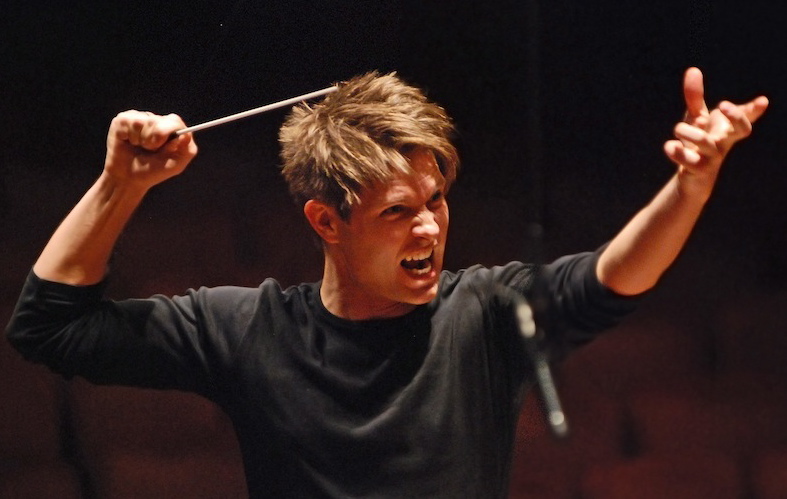Chopin, police choppers, and an impressive podium debut at Grant Park’s Polish night

Few would consider Witold Lutoslawski’s Concerto for Orchestra a rip-roaring audience favorite. Yet at the whirlwind conclusion of Wednesday night’s performance by the Grant Park Orchestra, the crowd of thousands stood and enthusiastically cheered conductor Krzysztof Urbanski, bringing the young Pole back for repeated curtain calls as if he were a rock star.
The 28-year-old maestro, who was making his Chicago debut, certainly looks the part with his slender good looks and imposing conductor hair. Yet, on a strange evening at Millennium Park with repeated distractions—notably a Chicago Police Department helicopter that made repeated disruptive flyovers over the Pritzker Pavilion during the concert—Urbanski managed to stay focused and showed himself a commanding podium figure, drawing powerful and iridescent performances in a challenging program of Polish music.
For most presenters, Polish music is invariably assigned to Chopin—particularly in this 200th birthday season—and left at that. But there is a vast array of varied and distinctive music created by Poland’s composers over the last two centuries, from the nationalistic operas of Moniuszko to the concertos of Paderewski and the 20th-century trinity of Penderecki, Lutoslawski, and Gorecki.
The Grant Park Music Festival served up a typically envelope-pushing program Wednesday, feting this year’s favorite son Chopin, but artfully flanking one of his concertos with two thornier works from the 20th century.
The concert, which was broadcast live on WFMT, led off with music by Wojciech Kilar. Born in 1932, Kilar is better known in this country as a film composer (Bram Stoker’s Dracula, The Portrait of a Lady, Death and the Maiden) but his Krzesany from 1974 shows a compelling concert-hall voice as well.
The title refers to a dance from the Tatra mountains characterized by three heavy foot stamps, striking the heels together and tapping the toes. Kilar takes the dance motif as a starting point for a 17-minute tone poem.
The music is bit episodic and, at times, suggestive of Gorecki in its dark, intense string lines, alternating with jagged fortissimo outbursts and astringent wind and brass writing. The music gathers considerable motoric fervor, rounded off with a cacophonous folk-flavored coda in which whirling high winds soar over multiple lines in different parts of the orchestra going full tilt, with the brass players standing for the final bars to add to the tumult.
The offbeat but intriguing work makes one want to explore more of Kilar’s output. Urbanski led a taut and concentrated performance that brought out the drama, folk strain and sheer weirdness to superb effect with terrific bravura playing by the Grant Park musicians.
The long shadow of Bela Bartok is apparent in Lutoslawski’s Concerto for Orchestra, written just a few years after the Hungarian composer’s celebrated work in the same genre. Yet the young Lutoslawski was not intimidated by his older colleague. While his concerto has outward trace elements of Bartok’s work, it is very much his own audacious creation from the forceful arch-like opening Intrada to the mercurial charm and darkness of the second movement. The finale is a large-scale Passcaglia spanning fifteen variations with a contrasting wind chorale that links the work more closely to Bartok.
This is extraordinarily difficult and challenging music to perform and it is a mark of the Grant Park players’ abilities that they can deliver such a gleaming and well-played account on limited rehearsal time. Urbanski displayed real musical leadership here, bringing a sense of the long line and overall structure, his clarity, dexterous balancing and wide dynamic range consistently ensuring that Lutoslawski’s kaleidoscopic scoring came across. The Grant Park players were clearly responsive to their young maestro, playing with daunting intensity, the brass especially imposing in the final bars.
In the Chopin centerpiece, soloist Krzysztof Jablonski displayed scintillating articulation and sizzle in the Piano Concerto No. 1. The Polish pianist also showed admirable poise and professionalism in keeping his composure despite being repeatedly buzzed by a CPD helicopter, said to be looking for “gang activity” (classical concerts of Chopin and Lutoslawski being well-known magnets for criminal misdeeds).
Jablonski’s fizzing virtuosity and supple, natural eloquence showed some of the spark that was largely missing from Garrick Ohlsson’s bland Chopin outing Monday night at Ravinia. Here Urbanski’s accompaniment was a bit slack with moments of miscoordination, likely due to the bulk of rehearsal time being spent on the other two works.
Posted in Performances


